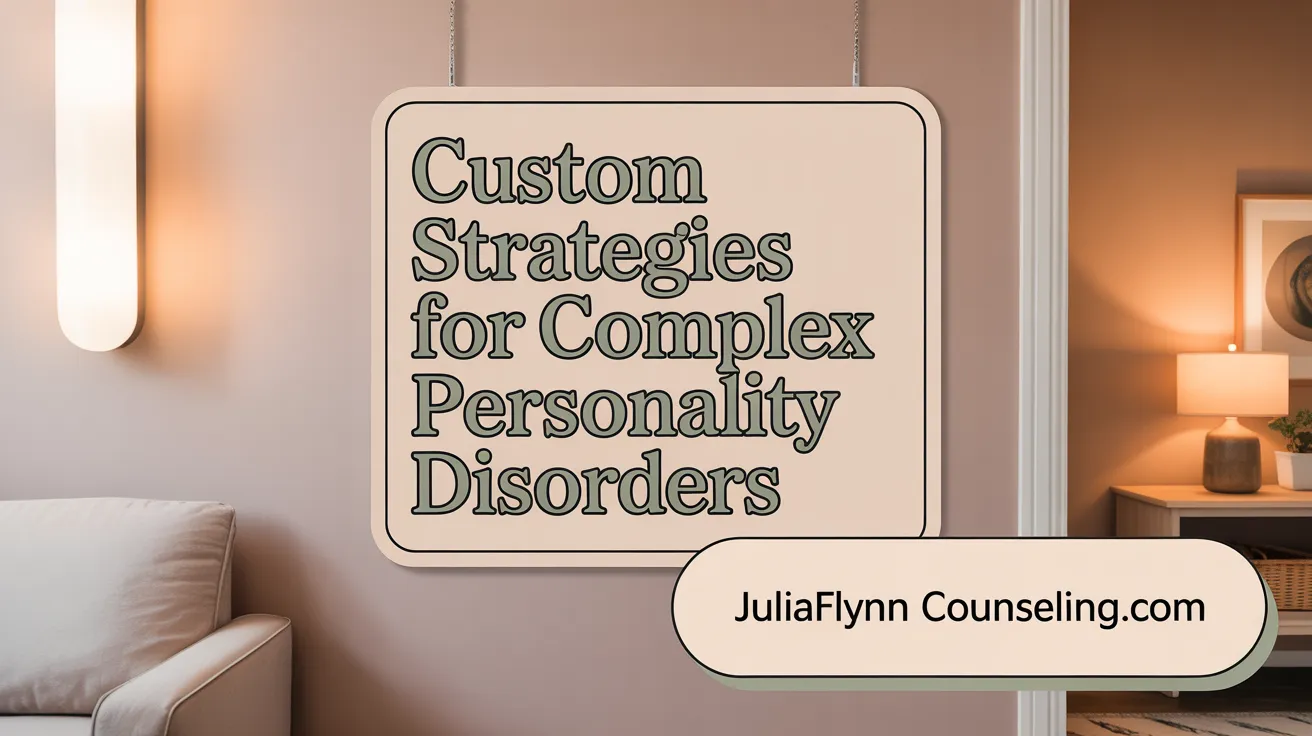The Shift Towards Individualized Mental Health Care
The landscape of mental health treatment is undergoing a transformative shift from traditional one-size-fits-all methods to personalized approaches that cater to individual patient personalities, traits, and unique needs. Research and technological advances now allow clinicians to tailor interventions more precisely, leading to improved outcomes and patient satisfaction. This narrative explores how personality types influence mental health care personalization and the integration of cutting-edge methods and therapies that address these nuances.
Understanding Personality and Its Impact on Mental Health Treatment
Definition and Models of Personality
Personality encompasses the consistent patterns in how individuals think, feel, and behave. Various models explain these traits, including the Four Personality Types—Type A (organized and motivated), Type B (relaxed and adaptable), Type C (emotionally reserved and conscientious), and Type D (anxious and pessimistic). Another well-recognized framework is the Big Five, which highlights five traits: openness, conscientiousness, extraversion, agreeableness, and neuroticism.
Influence of Personality Traits on Mental Health Outcomes
Personality traits strongly influence mental health. High neuroticism, characterized by emotional instability, is linked with greater risk for depression and anxiety. Conversely, traits like extraversion and agreeableness typically offer protective effects, promoting better social functioning and resilience. Conscientiousness is associated with healthier coping and longer lifespan, while openness encourages adaptability and curiosity. These traits impact how individuals experience stress and mental health challenges. See research on personality traits and mental health relationships for deeper insights.
Relationship Between Personality and Therapy Outcomes
Personality assessments can predict how individuals might respond to therapy. Patients with lower neuroticism often have more favorable outcomes, whereas high neuroticism can complicate treatment. Traits such as extraversion, agreeableness, conscientiousness, and openness generally correlate with improved therapy effectiveness. Understanding these traits enables clinicians to tailor treatment plans by highlighting patient strengths and identifying potential barriers, thereby enhancing personalized care and therapeutic success. For empirical evidence, see personality traits and therapy outcomes.
How do personality traits influence mental health and treatment outcomes?
Personality traits shape emotional responses, interpersonal dynamics, and stress management, which directly affect mental health and therapeutic progress. High neuroticism increases vulnerability to mood disorders and challenges in therapy. In contrast, higher levels of extraversion and conscientiousness foster engagement and positive treatment response. Thus, integrating personality evaluations into care supports personalized strategies that optimize mental health outcomes.
Personality Assessment Tools and Their Role in Tailored Therapies
Common personality tests and their application
Personality assessment tools widely used in mental health include the Big Five model, Myers-Briggs Type Indicator (MBTI), Eysenck Personality Inventory, HEXACO, DiSC, and the Sixteen Personality Factor Questionnaire (16PF). These tests evaluate characteristic patterns of thoughts, feelings, and behaviors that influence a person’s interaction with their environment and emotional health.
Clinicians use these instruments to better understand patients' personality traits, which can inform decisions about therapy types and strategies that may be most effective. For example, higher levels of neuroticism may suggest susceptibility to mood disorders, guiding the choice of interventions like cognitive-behavioral therapy to address anxiety or depression. Similarly, understanding whether a client is more introverted or extraverted can help tailor social skills training or approaches to engagement.
Limitations of personality assessments
Despite their utility, personality tests have limitations. These tools may not capture the full complexity and fluidity of an individual's personality, as traits can evolve over time and under different life circumstances. Additionally, assessments rely on self-reporting, which can be influenced by current mood or biases. Interpreting results requires clinical judgment to avoid overgeneralization or misapplication (Personality traits stability during psychotherapy).
Using personality data for therapy customization
Integrating personality assessment data into personalized therapy involves identifying client strengths and potential barriers. For instance, a highly conscientious person might benefit from structured therapy sessions and homework assignments, while a client scoring high in openness might be more receptive to experiential or creative therapy approaches.
Therapists may adjust session pace, intensity, and therapeutic techniques in response to personality profiles. This tailored approach promotes a stronger therapeutic alliance and potentially improves outcomes by aligning treatment methods with individual differences (Meta-analytic review of personality traits).
| Assessment Tool | Primary Focus | Application in Therapy |
|---|---|---|
| Big Five Model | Core personality traits | Guides therapy focus on emotional regulation and coping styles |
| MBTI | Personality types based on dichotomies | Helps match therapy communication styles |
| Eysenck Inventory | Personality dimensions like extraversion and neuroticism | Predicts emotional vulnerabilities for treatment planning |
Using personality data responsibly enhances personalized mental health care by supporting evidence-based adaptations rather than relying solely on clinical intuition.
Integrating Personality Insights into Precision Mental Health Care

How do modern technologies facilitate personalization based on personality?
Advances in Big Data in Mental Health, Machine Learning Applications, and Artificial Intelligence in Mental Health (AI) have revolutionized personalization in mental health care by allowing detailed analysis of individual characteristics, including Personality Traits Overview. Digital tools such as Mobile Apps and Wearable Devices, and questionnaires collect comprehensive patient data—from symptoms to behavioral patterns and personality profiles. These data inputs are processed with sophisticated algorithms that compare an individual's information against vast databases to identify specific Prognostic Factors in Mental Health and Moderators of Treatment Outcomes relevant to their mental health.
Through these technologies, Precision Mental Health Care moves beyond traditional clinical intuition by offering data-driven, tailored treatment recommendations. Algorithms help clinicians understand how personality factors like Neuroticism and Mental Health, Extraversion Trait, or Conscientiousness Trait might influence treatment responses and symptom progression.
Role of AI and Machine Learning
AI and Machine Learning for Personalized Mental Health models enhance the accuracy of outcome predictions, enabling early intervention and more effective therapy adjustments. By recognizing patterns in personality-related data, they assist in identifying suitable therapies, optimal session frequency, and therapist-patient matching. For instance, patients exhibiting high neuroticism might benefit from targeted Cognitive-Behavioral Therapy (CBT), which an AI system could help highlight.
Clinical Decision Support Systems
Clinical Decision Support Systems (CDSS) integrate these AI-driven insights into the clinical workflow without replacing the essential therapist-patient relationship. CDSS provide evidence-based, personalized recommendations that support clinicians in their decisions, ensuring treatments align with patient-specific personality profiles and symptom networks. This integration facilitates continuous treatment monitoring and timely adaptation based on real-time data.
In summary, modern technologies harness personality data through intelligent analysis and clinical support tools, making mental health care more precise, effective, and individualized.
Tailoring Psychotherapy to Personality Profiles

How can psychotherapy be tailored according to personality types?
Psychotherapy can be personalized by aligning treatment approaches with an individual's personality traits and characteristics. Different personality profiles may respond better to specific modalities such as Cognitive-Behavioral Therapy (CBT), Dialectical Behavior Therapy (DBT), psychodynamic therapy, or humanistic therapy. For instance, research shows CBT is particularly effective for some depression biotypes associated with distinct brain circuit dysfunctions (Precision mental health care). Data-driven models and precision mental health tools help in identifying these profiles.
Treatment modalities adapted to personality types
Therapists may select or adapt therapies based on personality traits like neuroticism, extraversion, and conscientiousness (Meta-analytic review of personality traits. High neuroticism often signals a need for emotion regulation techniques seen in DBT, while openness and extraversion might favor experiential or humanistic approaches that encourage exploration and social engagement (Personality and mental health). Tailored therapy plans consider these tendencies to maximize treatment effectiveness and patient adherence.
Therapeutic alliance and personality
The quality of the therapeutic alliance profoundly impacts outcomes. Matching patient and therapist personalities or styles can improve rapport and trust, fostering better engagement. Patients and therapists generally welcome using data on therapist effectiveness and personality compatibility. This supportive relationship can motivate clients, especially those with challenging traits or comorbid conditions (Personality traits and psychotherapy.
Adjusting therapy strategies
Therapists also adapt homework and between-session assignments thoughtfully. Adjusting the difficulty, timing, or type of tasks helps clients overcome barriers like discomfort, motivational issues, or external challenges (e.g., caregiving responsibilities) (Tailored therapy homework). Incorporation of technology—such as mobile apps and wearable devices—can further personalize engagement by considering real-time context and preferences.
Personalizing psychotherapy by integrating personality assessments and individualized treatment strategies enhances both the therapeutic process and clinical outcomes.
The Role of Personality in Pharmacogenomics and Medication Management

Genetic testing and medication response
Pharmacogenomics is a cutting-edge approach that uses genetic testing to predict how individuals will respond to psychiatric medications. This helps clinicians identify the most effective medications with the fewest side effects for each patient, thereby reducing the traditional trial-and-error method often seen in mental health treatment. By understanding genetic markers, healthcare providers can tailor prescriptions, improving both treatment outcomes and patient satisfaction.
Personality influence on medicine adherence
Personality traits significantly affect how patients manage their medication routines. For example, conscientious individuals are generally more likely to adhere to prescribed treatment plans, while those with high neuroticism may struggle with medication compliance due to anxiety or mood instability. Recognizing these behavioral tendencies allows clinicians to anticipate challenges and offer supportive strategies tailored to the patient's personality profile.
Personalized medication strategies
Combining pharmacogenomic data with personality assessments forms a comprehensive personalized medication strategy. This integrative approach aligns drug selection and dosage with individual genetic makeup and psychological characteristics. It supports patients not only biologically but also behaviorally, fostering better adherence and optimizing therapeutic effects. By addressing both genetic and personality factors, personalized medication management advances the efficacy of mental health treatments and promotes long-term wellness.
Addressing Personality Disorders Through Personalized Therapies

Challenges of treating personality disorders
Personality disorders involve long-lasting maladaptive thoughts, behaviors, and emotional patterns that severely disturb relationships and well-being. Managing these disorders is difficult because their symptoms are deeply ingrained and patients often lack insight. Additionally, stigma and clients’ resistance can hinder engagement with treatment (Personality Disorders Overview, Stigma and Discrimination, Personality pathology in geriatric mental healthcare).
Evidence-based approaches
Personalized therapies emphasize tailoring treatment to individual traits and histories. Dialectical Behavior Therapy (DBT) is widely used to reduce emotional dysregulation and self-harm, particularly in borderline personality disorder (DBT for Borderline Personality Disorder). Schema-Focused Therapy (SFT) targets dysfunctional cognitive and emotional patterns by fostering healthier schemas. These approaches consider patients' unique symptom profiles, enabling targeted interventions rather than a one-size-fits-all method.
Promoting psychological adaptability
Beyond symptom reduction, modern treatments aim to enhance patients’ psychological flexibility and well-being. Creative Arts and Psychomotor Therapies (CAPTs) use experiential activities—such as visual art, music, dance, and drama—to evoke emotions and behaviors, helping patients gain insight and develop adaptive coping strategies (CAPTs interventions and evidence). Combining CAPTs with SFT shows promise in improving adaptability and overall mental health.
Personalized treatment plans for personality disorders that integrate these methods focus on both reducing pathological symptoms and promoting resilience, supporting lasting psychological health improvements (Personalized mental health treatment approaches, Common treatment principles in psychotherapy).
Therapist Matching and the Impact of Personality Compatibility
Why is matching patients with therapists based on personality important?
Therapist effectiveness varies widely, and this variation can impact therapy outcomes significantly. Research shows that when patients are matched with therapists whose personality traits and therapeutic styles align well with their own, it fosters a stronger therapeutic alliance Personality traits and therapy outcomes.
Compatibility between patient and therapist enhances engagement and trust, which are foundational to successful therapy Individual therapy overview. A personalized match helps reduce feelings of misunderstanding or discomfort that might arise with a less compatible therapist, thus promoting better adherence to treatment Personality and mental health.
Both patients and therapists generally view the use of data, including outcome statistics and therapist effectiveness measures, positively. Such data can guide the matching process, helping to identify which therapist characteristics work best for specific patient profiles Therapist Effectiveness Information.
By tailoring therapist assignments based on personality compatibility and evidence of therapist success, mental health providers can improve treatment outcomes and patient satisfaction without compromising the therapeutic relationship's human aspect Clinical Decision Support Systems (CDSS).
The Influence of Personality Traits on Treatment Engagement and Utilization

Personality and treatment adherence
Personality traits play a significant role in how individuals engage with and utilize mental health services. Research shows that people with higher emotional stability (the opposite of neuroticism), greater extraversion, and conscientiousness tend to use mental health care services less over time. This pattern suggests these individuals may manage symptoms more effectively or experience less severe mental health problems. In contrast, individuals with high neuroticism often require more treatment and may face greater challenges in recovery (Personality traits and mental health care utilization).
Personality change during therapy
While personality traits are generally stable, they can show modest changes during psychotherapy. Studies indicate that neuroticism tends to decrease slightly over the course of therapy, while extraversion and openness may increase. These shifts are associated with improvements in symptoms and functional impairment, highlighting how therapy not only addresses mental health issues but also subtly influences underlying personality characteristics (Personality traits overview.
Long-term mental health care utilization patterns
Longitudinal studies reveal that personality traits influence patterns of mental health care utilization over decades. Individuals who show increases in emotional stability, extraversion, and conscientiousness are more likely to reduce their use of mental health services. Conversely, persistent high neuroticism correlates with more frequent and prolonged treatment engagement, indicating a need for tailored therapeutic strategies (Personality traits and mental health care utilization.
These findings underscore the importance of considering personality traits in mental health treatment planning. By understanding how personality affects therapy engagement and outcomes, clinicians can personalize interventions to improve adherence and effectiveness, fostering better long-term mental health management (Personalizing Mental Health Interventions).
The Promise and Challenges of Digital Tools in Personalized Mental Health Care

What role do digital technologies play in tailoring mental health treatment?
Digital technologies have become invaluable in personalizing mental health care by providing real-time data monitoring and tailored therapeutic interventions. Mobile apps that integrate cognitive-behavioral therapy (CBT) techniques and other evidence-based methods allow patients to engage with therapy homework customized to their individual progress and preferences. These apps enhance treatment adherence by adapting to the client’s skills, emotions, and daily context.
AI-powered chatbots, such as Woebot and Wysa, offer immediate support aligned with cognitive-behavioral principles, helping to manage anxiety and depression outside traditional clinical hours. Furthermore, predictive models utilizing multifaceted patient data—including genetics, lifestyle, and behavior—enable tailored prevention strategies and early intervention, such as personalized suicide risk prediction.
Between-session tailoring and technology
Therapy homework between sessions is a critical part of mental health treatment, where digital tools contribute by assessing client competence and motivation, adapting tasks dynamically, and offering alternatives when barriers arise. Technologies can adjust complexity or timing based on patient feedback and environmental context, creating a more flexible and client-centered therapy experience.
Digital platforms facilitate ongoing engagement by bridging therapist insights with automated support, ensuring interventions remain relevant and effective across treatment phases.
Ethical and privacy considerations
Despite the benefits, digital mental health tools face significant ethical challenges. Ensuring data privacy and security is paramount, as sensitive health information is collected continuously. Risks of bias in AI algorithms can exacerbate disparities, especially if demographic factors are not properly considered. Maintaining human oversight is essential to prevent overreliance on technology and to preserve the therapeutic alliance.
Transparency regarding data use and AI decision-making builds patient trust, and guidelines must safeguard participants against unintended harms. These considerations are critical for integrating digital tools into personalized mental health care responsibly and effectively.
Holistic and Contextual Factors in Personalizing Mental Health Treatment

How do social and environmental factors integrate into personalized treatment?
Personalized mental health care increasingly recognizes that effective treatment must address more than just clinical symptoms. Social determinants such as poverty, systemic racism, unstable housing, and trauma exposure significantly influence mental health outcomes and recovery trajectories. Incorporating these factors into treatment planning helps create interventions that are not only relevant but equitable (WHO mental health guidance, health care for homeless people).
Trauma-informed care is essential in this holistic approach. Understanding a patient's trauma history fosters a therapeutic environment that reduces retraumatization and promotes healing (Personalized Care in Mental Health). Cultural sensitivity further improves treatment engagement by respecting diverse backgrounds and experiences (one-size-fits-all mental health care).
Lifestyle and environmental factors like nutrition, sleep quality, physical activity, and social support networks play critical roles in mental well-being. Personalized plans often include strategies to enhance these areas, supporting broader health beyond symptom management (Personalized mental health treatment, Personalized Care in Mental Health.
Additionally, addressing barriers such as transportation challenges, stigma, and fragmented services is vital, especially for vulnerable groups like homeless individuals. Utilizing telemedicine, coordinating with community resources, and adapting intervention methods help overcome these obstacles, offering tailored, accessible care (health care for homeless people, Stigma, prejudice and discrimination against people with mental illness). Such integrative efforts ensure mental health interventions are comprehensive, adaptable, and patient-centered (Personalized Mental Health Solutions).
Future Directions: Research and Implementation of Personalized Mental Health Care
What are the future challenges and opportunities in personalized mental health care?
Personalized mental health care holds significant promise due to advances in Clinical Decision Support Systems (CDSS), Machine Learning Applications, and Artificial Intelligence in Mental Health that enable tailored interventions for individual patients. However, this field faces several pivotal challenges that must be addressed to fully realize its potential.
One major challenge is the external validation of precision models. While many predictive algorithms and routine outcome monitoring (ROM) systems have shown accuracy in controlled research settings, their performance needs confirmation across diverse real-world populations. Ensuring models are generalizable and reliable when applied broadly is essential to prevent adverse outcomes.
Equitable Implementation of Mental Health Care and accessibility remain critical concerns. Personalized care approaches often rely on Digital Tools for Patient Data collection, which may not be equally available or acceptable to all patient groups. Socioeconomic disparities, digital divides, and cultural differences could exacerbate existing gaps in mental health care unless specifically addressed through inclusive design and policy measures.
Integration into clinical practice demands strategies that support clinicians without undermining the therapeutic relationship. Clinical Decision Support Systems (CDSS) should augment, not replace, human judgment. Training the mental health workforce to engage with new tools, interpret data effectively, and navigate ethical issues will be vital.
Policy reforms will play a key role in enabling wide adoption of personalized mental health care. Frameworks promoting person-centered interventions, protecting patient data privacy, and incentivizing the flexible use of evidence-based treatments are necessary. Additionally, embedding personalization across the entire care continuum—from prevention to diagnosis, treatment, and ongoing monitoring—will enhance treatment outcomes.
Sustained research efforts are needed to explore causal mechanisms behind symptom variability, develop scalable implementation protocols, and conduct prospective efficacy studies. Embracing interdisciplinary collaboration among clinicians, data scientists, policymakers, and patients will accelerate progress.
In summary, the future of personalized mental health care lies in balancing technological innovation with practical, equitable implementation, ensuring tailored treatments improve outcomes for all individuals.
Personalization as the Path Forward in Mental Health Treatment
Personalizing mental health treatments to individual personalities represents a pivotal advancement in psychiatric care. By acknowledging the diverse psychological profiles, leveraging technology and data, and addressing social and systemic barriers, practitioners can offer therapies that are more effective, engaging, and humane. Although obstacles remain in standardizing and scaling these approaches, the integration of personality insights into tailored interventions offers hope for improved mental wellness and sustained recovery across populations.
